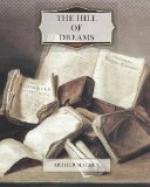into lazy motion. In the well of the valley a
wandering line of bushes showed where a brook crept
in and out amongst the meadows, and, as Lucian stood,
lingering, on the bridge, a soft and idle breath ruffled
through the boughs of a great elm. He felt soothed,
as by calm music, and wondered whether it would not
be better for him to live in some such quiet place,
within reach of the streets and yet remote from them.
It seemed a refuge for still thoughts; he could imagine
himself sitting at rest beneath the black yew tree
in the farm garden, at the close of a summer day.
He had almost determined that he would knock at the
door and ask if they would take him as a lodger, when
he saw a child running towards him down the lane.
It was a little girl, with bright curls tossing about
her head, and, as she came on, the sunlight glowed
upon her, illuminating her brick-red frock and the
yellow king-cups in her hat. She had run with
her eyes on the ground, chirping and laughing to herself,
and did not see Lucian till she was quite near him.
She started and glanced into his eyes for a moment,
and began to cry; he stretched out his hand, and she
ran from him screaming, frightened no doubt by what
was to her a sudden and strange apparition. He
turned back towards London, and the mist folded him
in its thick darkness, for on that evening it was tinged
with black. It was only by the intensest strain
of resolution that he did not yield utterly to the
poisonous anodyne which was always at hand. It
had been a difficult struggle to escape from the mesh
of the hills, from the music of the fauns, and even
now he was drawn by the memory of these old allurements.
But he felt that here, in his loneliness, he was in
greater danger, and beset by a blacker magic.
Horrible fancies rushed wantonly into his mind; he
was not only ready to believe that something in his
soul sent a shudder through all that was simple and
innocent, but he came trembling home one Saturday
night, believing, or half-believing, that he was in
communion with evil. He had passed through the
clamorous and blatant crowd of the “high street,”
where, as one climbed the hill, the shops seemed all
aflame, and the black night air glowed with the flaring
gas-jets and the naphtha-lamps, hissing and wavering
before the February wind. Voices, raucous, clamant,
abominable, were belched out of the blazing public-houses
as the doors swung to and fro, and above these doors
were hideous brassy lamps, very slowly swinging in
a violent blast of air, so that they might have been
infernal thuribles, censing the people. Some
man was calling his wares in one long continuous shriek
that never stopped or paused, and, as a respond, a
deeper, louder voice roared to him from across the
road. An Italian whirled the handle of his piano-organ
in a fury, and a ring of imps danced mad figures around
him, danced and flung up their legs till the rags
dropped from some of them, and they still danced on.
A flare of naphtha, burning with a rushing noise,




